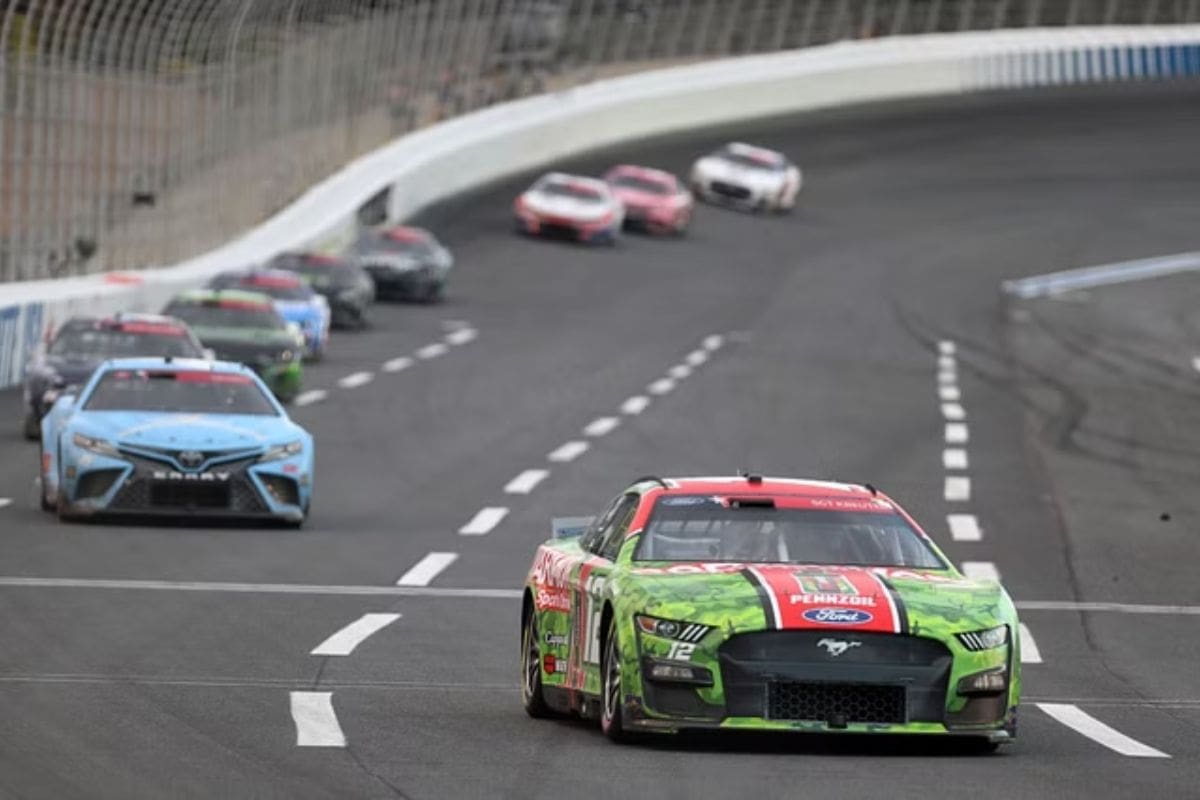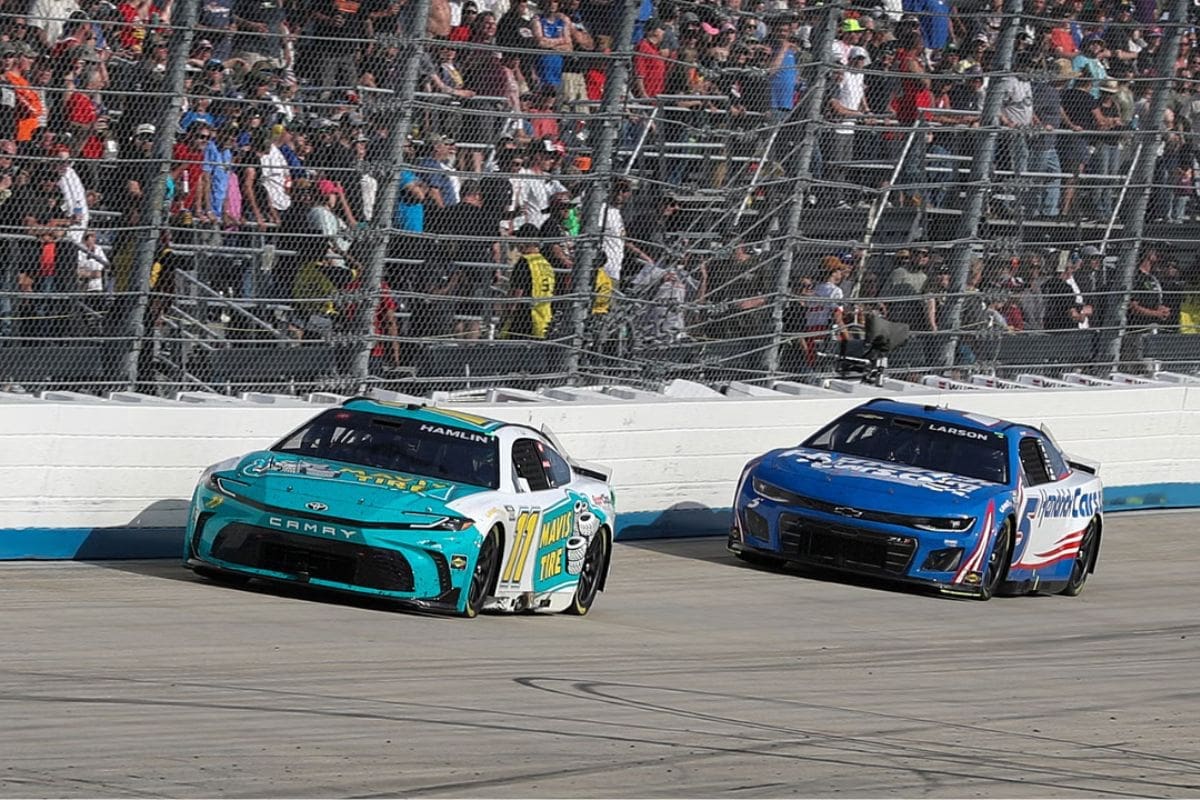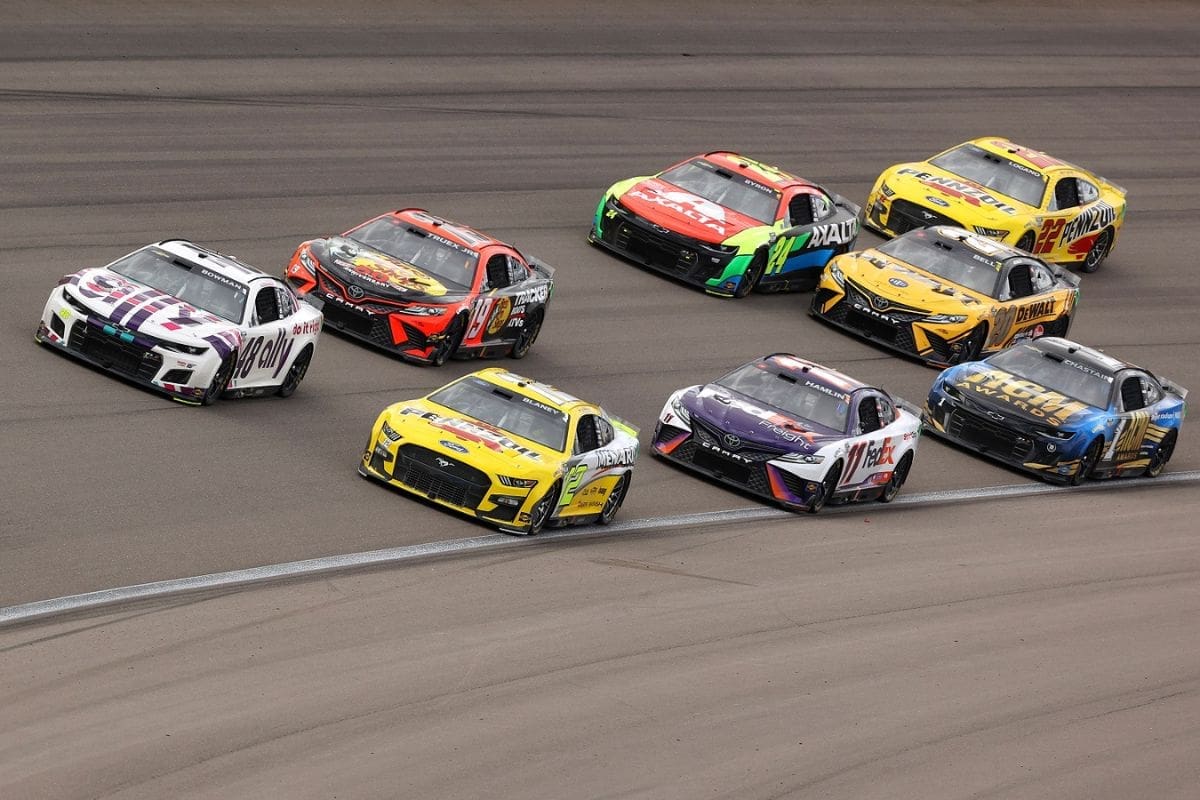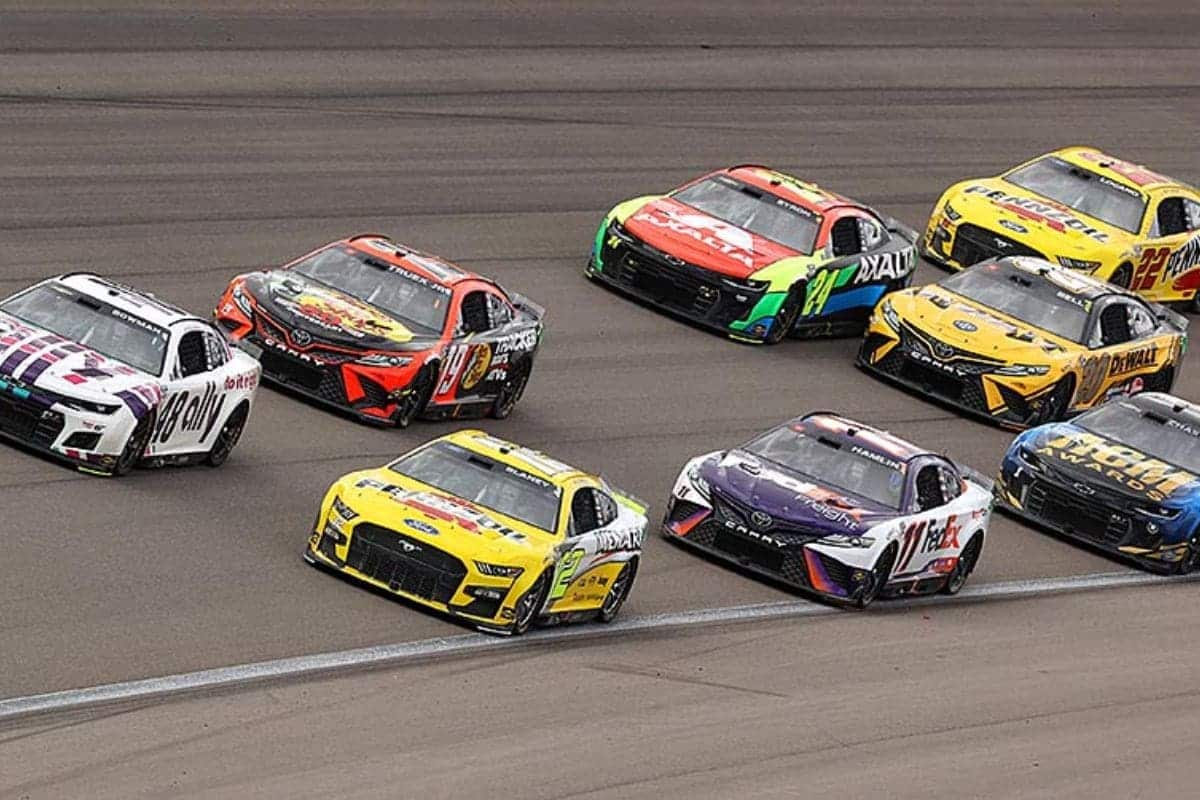Hendrick and Gibbs Dodge NASCAR’s Wrath: As Stewart-Haas Racing grapples with financial instability and contemplates potential charter sales, the resilience of Hendrick Motorsports and Joe Gibbs Racing becomes increasingly remarkable. Unlike SHR, these powerhouse teams have managed to sidestep the turbulence that has recently beset NASCAR, maintaining solid sponsorships and consistent performance. This stability highlights the strategic strength of Hendrick and Gibbs but also raises questions about the long-term implications for the sport’s competitive landscape.
Key Highlights
- Hendrick Motorsports and Joe Gibbs Racing retain their four-car teams due to a grandfathering clause.
- NASCAR’s proposed three-charter limit does not apply to Hendrick and Gibbs, sustaining their competitive advantage.
- Stewart-Haas Racing’s potential charter sale may lead to redistribution of opportunities across teams.
- Fans express frustration over perceived favoritism towards established teams like Hendrick and Gibbs.
- Financial struggles and sponsorship losses drive Stewart-Haas Racing to consider selling their charters.
Stewart-Haas Racing’s Financial Struggles and Potential Charter Sale
Stewart-Haas Racing is facing significant financial challenges, prompting speculation about the potential sale of several of its valuable NASCAR charters. This move could be a strategic response to the increasing costs and financial challenges that have become more prevalent in the high-stakes world of NASCAR.
The value of NASCAR charters has soared dramatically, evidenced by a recent transaction where Spire Motorsports acquired a charter for an astonishing $40 million. This surge in value, which has seen charter prices rise nearly eleven-fold.
However, the potential sale by Stewart-Haas Racing comes at a critical moment. The market’s current trajectory suggests that the booming charter prices might soon encounter a plateau. Should Stewart-Haas Racing proceed with the sale, it might indicate a turning point in the market, potentially stabilizing or even reducing the previously escalating values. This would have significant implications for the broader NASCAR ecosystem, as teams often rely on the increasing value of charters to secure financial stability and growth.
Moreover, the consideration of offloading charters by Stewart-Haas Racing could indicate a broader trend within the industry, where financial prudence might outweigh expansion ambitions. This shift is particularly relevant as the sport contemplates a future where only a select few major players might continue to thrive while others scale back operations.
Potential Impact of Stewart-Haas Racing’s Decision
The potential sale of all four charters by Tony Stewart’s team could profoundly reshape the competitive and financial landscape of NASCAR. Stewart-Haas Racing (SHR) has been grappling with significant sponsorship losses, including notable brands such as Anheuser-Busch, Smithfield Foods, and Hunt Brothers Pizza. The possibility of SHR offloading their charters introduces a seismic shift in the distribution of these valuable assets, which were initially granted for free back in 2016.
From a competitive standpoint, the sale of four SHR charters would mean a redistribution of opportunities among existing teams and potential new entrants. Established teams like Hendrick Motorsports and Joe Gibbs Racing, which have so far dodged similar financial pitfalls, might see this as an opening to expand their influence and secure additional charters.
Conversely, new teams with fresh sponsorship backing could seize the moment to enter the NASCAR Cup Series, thereby intensifying competition. Financially, the flow of four charters into the market could lead to a temporary depreciation in their value due to oversupply. However, this could also democratize access to the series, allowing smaller teams with limited budgets to participate more feasibly.
Potential Market Impact and Rule Changes
Amid speculations of a potential market shift, the anticipated sale of charters by Tony Stewart’s team could precipitate significant changes in NASCAR’s economic and regulatory landscape. The sale of these charters, estimated between $20-30 million each, might initially depress charter prices due to increased supply. Nevertheless, this dip may be short-lived as market dynamics and upcoming charter negotiations could heighten prices to unprecedented levels.
The potential sale of all four charters by Stewart-Haas Racing (SHR) introduces not only economic implications but also regulatory considerations. Discussions around a new rule limiting teams to a maximum of three charters could reshape team strategies and investments. This proposed cap aims to balance competition and ensure a more fair distribution of resources across teams. However, exceptions for established powerhouses like Hendrick Motorsports (HMS) and Joe Gibbs Racing (JGR), due to being ‘grandfathered in,’ could sustain their competitive advantage.
Smaller teams might find opportunities to acquire charters at a temporarily reduced rate, potentially leveling the playing field. Conversely, larger teams, exempt from the new cap, could consolidate their dominance, leveraging their historical investments and strategic foresight.
View this post on Instagram

Fan Reaction and Controversy
Reactions among NASCAR fans expressing bewilderment and concern over the proposed rule capping teams at three charters while allowing exceptions for established giants like Hendrick Motorsports and Joe Gibbs Racing. This potential rule change has ignited a debate within the NASCAR community, as fans grapple with the implications for competitive balance and fairness in the sport.
“So they’re losing owners but won’t allow current teams to expand past three cars? Still beyond sad that Gene and Tony ran this team into the ground and then bail after dozens of victories and two Cup titles.” – fan reaction
Critics argue that the grandfathering clause for Hendrick Motorsports and Joe Gibbs Racing undermines the essence of the rule, which ostensibly aims to level the playing field. By allowing these powerhouses to retain more than three charters, NASCAR may inadvertently perpetuate a system favoring established teams, thereby stifling opportunities for emerging competitors. This perceived inconsistency has led to accusations of favoritism and has fueled a narrative that NASCAR’s governance.
“BS !!! Hendrick and Gibbs should have to follow the rules just like the others! Once again, NASCAR favors them !! They will be allowed to have more cars and collect more R&D than other teams!! Which once again gives them more advantage! NASCAR has catered to those teams for 20 years now!! Johnson would NOT have that many championships if NASCAR didn’t cater to them!! I don’t recognize his accomplishments.”
“Of course hms and JGR would. The only teams able to afford a four car team to begin with.“
“Hms and jgr shouldn’t get grandfathered in IMO.” – fans reaction
Conversely, supporters of the rule highlight the practical benefits of maintaining stability among top-tier teams. Hendrick Motorsports and Joe Gibbs Racing have been instrumental in driving fan engagement and sponsorship deals, which are essential for NASCAR’s financial health. Proponents suggest that destabilizing these entities could have unintended negative repercussions on the sport’s entire ecosystem.
The potential sale of Stewart-Haas Racing’s charters further complicates the landscape, with rumors indicating interest from teams such as Front Row Motorsports, Trackhouse Racing, Legacy Motor Club, and Richard Childress Racing. This dynamic shift could redefine team alliances and competitive hierarchies, adding another layer of complexity to an already contentious issue.
Fan Comments and Perspectives
In the wake of the proposed rule changes, fan comments reveal a significant frustration and skepticism regarding NASCAR’s decision-making process. The discourse among fans is marked by a critical tone, as they grapple with the implications of Tony Stewart’s withdrawal and the limitations on team expansions. The prevailing sentiment seems to be one of disillusionment, with many voicing concerns about the future direction of the sport.
- Owner Withdrawal: The departure of a central figure like Tony Stewart has left fans questioning the sustainability and management of teams. One fan lamented, ‘So they’re losing owners but won’t allow current teams to expand past three cars? Still beyond sad that Gene and Tony ran this team into the ground and then bail after dozens of victories and two Cup titles.’
- Field Reduction: Fans are wary of any further reduction in the racing field, as it potentially detracts from the competitiveness and excitement of the sport. A comment succinctly posed the concern, ‘More field reduction?’
- Team Expansion Limits: The restriction on expanding teams beyond three cars has been met with particular ire. One fan’s straightforward criticism, ‘Why only 3 a team? That’s dumb,’ reflects a broader sentiment that such limitations are counterproductive.
- NASCAR’s Governance: There is a palpable skepticism towards NASCAR’s governance and rule-making, with fans feeling that their perspectives and the sport’s tradition are being overlooked in favor of other interests.
News in Brief: Hendrick and Gibbs Dodge NASCAR’s Wrath
Stewart-Haas Racing’s financial difficulties and potential charter sales could greatly alter the NASCAR landscape. The stability and resilience demonstrated by Hendrick Motorsports and Joe Gibbs Racing highlight their skill in maneuvering through industry challenges.
The potential market impact and resulting rule changes require close scrutiny, as fan reactions and controversies emphasize the sport’s shifting dynamics. The adaptability of powerhouse teams will likely continue to set the standard in an evolving NASCAR ecosystem.
Q. What was the last Dodge team in NASCAR?
A. By 2011, Penske Racing stood as the lone NASCAR Cup Series team fielding Dodges full-time, with many former Dodge teams either folding or switching manufacturers. On March 1, 2012, team owner Roger Penske announced that Penske Racing would return to full-time Ford entries in 2013.
Q. Did NASCAR punish Hendrick Motorsports?
A. NASCAR has handed down significant penalties to Hendrick Motorsports, docking each team 100 regular-season points and 10 playoff points. Additionally, each team faces a $100,000 fine, and crew chiefs Rudy Fugle, Alan Gustafson, Cliff Daniels, and Blake Harris are suspended for the next four races. These fines, totaling the largest in NASCAR history, have led Hendrick to announce plans to appeal the decision.
ALSO READ: Stewart-Haas Racing Eyes 100M Dollar Charter Shift: NASCAR Shakeup Ahead




If HAAS wants to get well it should sell its F1 Charter to Andretti Global, to get out of F1 where it’s doing nothing but filling a starting slot at the back of the grid.